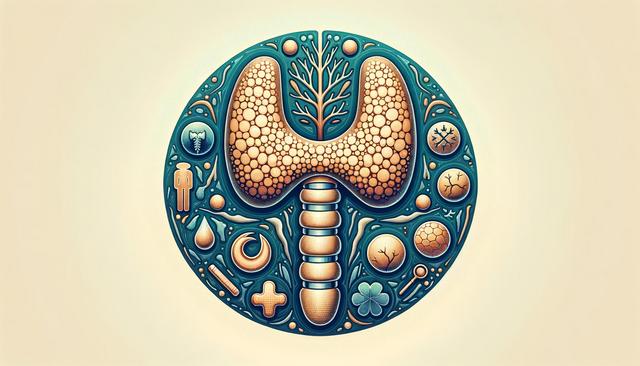Understanding the Role of the Thyroid Gland
The thyroid gland is a small, butterfly-shaped organ located at the base of the neck. Despite its size, it plays a significant role in regulating various body functions. It produces hormones that influence metabolism, growth, and energy levels. When the thyroid becomes underactive, or hypothyroid, it doesn’t produce enough of these essential hormones. This hormonal imbalance can impact numerous systems in the body, leading to a wide range of symptoms. Early detection is often challenging because the symptoms can be subtle and easy to attribute to other causes, such as stress or aging. That’s why understanding the thyroid’s function is a key step in recognizing when something may be wrong.
Hormones produced by the thyroid—mainly thyroxine (T4) and triiodothyronine (T3)—affect how the body uses energy. When these hormones are deficient, many physiological processes slow down. This reduction in hormone levels can manifest in ways that are often dismissed or misinterpreted at first. Knowing the thyroid’s impact on metabolism, heart rate, and temperature regulation helps in identifying symptoms that could point to an underactive thyroid before they progress further.
Common Physical Symptoms to Watch For
Hypothyroidism often reveals itself through a variety of physical symptoms. These can develop gradually and may not be immediately alarming, but their persistence is a signal worth noting. Some of the most frequently reported physical indicators include:
- Persistent fatigue or weakness despite adequate rest
- Unexplained weight gain or difficulty losing weight
- Cold intolerance or feeling cold when others are comfortable
- Dry or pale skin and brittle nails
- Constipation without a clear dietary cause
- Swelling in the neck area, potentially indicating an enlarged thyroid (goiter)
These symptoms occur because a slower metabolism affects multiple body systems. For instance, reduced energy production can make day-to-day activities feel exhausting, while slowed digestion may lead to chronic constipation. Recognizing these physical signs early can prompt a conversation with a healthcare provider and lead to timely testing.
Cognitive and Emotional Changes
In addition to physical symptoms, hypothyroidism can influence mental and emotional health. The brain is particularly sensitive to hormonal shifts, and low levels of thyroid hormones can result in noticeable cognitive and mood-related changes. Common experiences include:
- Difficulty concentrating or memory lapses, sometimes described as “brain fog”
- Depressed mood or feelings of sadness without an obvious cause
- Increased irritability or sensitivity to stress
- Slower thought processes or speech patterns
These symptoms can be especially challenging because they often mimic or overlap with symptoms of depression or other mental health conditions. For individuals experiencing both emotional and physical changes, it’s important to consider that the underlying cause might be hormonal. Discussing these concerns with a healthcare provider can lead to appropriate thyroid function testing and a clearer understanding of the root issue.
Signs in Women and Older Adults
Women and older adults are more likely to develop hypothyroidism, and the symptoms can sometimes present differently in these groups. For women, hormonal fluctuations from menstruation, pregnancy, or menopause can mask or mimic thyroid-related symptoms. Some specific indicators in women may include:
- Irregular menstrual cycles or heavier-than-usual bleeding
- Fertility challenges without a clear explanation
- Hair thinning or hair loss, particularly around the scalp edges
In older adults, symptoms may be even more subtle or attributed to normal aging. For instance:
- Memory issues or confusion that resemble early dementia
- Slowed movements or speech
- General fatigue and low motivation
Since these signs can be mistaken for other age-related conditions, routine screening and awareness are particularly important in these populations. Recognizing patterns and combining symptom awareness with medical consultation can lead to earlier diagnosis and better outcomes.
When to Seek Medical Advice
Because hypothyroidism symptoms often develop gradually, it can be tempting to wait them out or attribute them to lifestyle factors. However, seeking medical advice when multiple symptoms persist is crucial. A healthcare provider can conduct a physical exam and order blood tests to measure levels of thyroid-stimulating hormone (TSH) and free T4. These simple tests can confirm whether the thyroid is underperforming.
It’s especially important to consult a doctor if:
- You experience a combination of symptoms for several weeks
- There is a family history of thyroid disorders
- You have an existing autoimmune condition
- You notice swelling in the front of your neck
Early diagnosis allows for more effective management, usually involving daily hormone replacement therapy. While hypothyroidism is typically a lifelong condition, it can be successfully managed with regular monitoring and adherence to prescribed treatment. Addressing symptoms early can prevent complications and improve quality of life.
Conclusion: The Importance of Early Recognition
Recognizing the early indicators of an underactive thyroid is vital for maintaining overall health and well-being. By paying attention to physical, cognitive, and emotional symptoms—and understanding how they may relate to thyroid function—individuals can take proactive steps toward diagnosis and treatment. Whether you’re experiencing fatigue, mood changes, or unexplained physical symptoms, it’s worth considering how your thyroid might be playing a role. Engaging with a healthcare professional early can lead to better management and a more balanced, energetic life.


